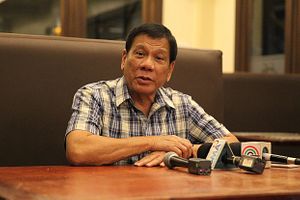Philippine Senator Leila De Lima marked her 1,000th day in a Quezon City prison in typical style this week, tweeting a damning screed against President Rodrigo Duterte and his war on drugs. Her “persecution is a testament to the Duterte government’s increasing authoritarianism,” Human Rights Watch said of the anniversary. It is also a testament to the issues of sexism and misogyny surrounding Duterte.
Duterte is no stranger to accusations of sexism and misogyny, despite the fact that he may have adopted some policy positions that are seemingly progressive. The 2016 election campaign shocked foreign watchers and prospective voters alike after the then-mayor joked about the rape and murder of Australian missionary Jacqueline Hamill, saying: “I was angry because she was raped, that’s one thing. But she was so beautiful, the mayor should have been first. What a waste.” After imposing martial law in Mindanao in 2017, he again ‘joked’ about rape, telling soldiers that any rape would “be on” him. Commenting last year on Davao City’s high incidents of rape, he explained it away. “As long as there are many beautiful women, there will be more rape cases,” he said.
In an excellent essay for the Atlantic last year, Ana P. Santos explored how the Filipino concept of machismo has effectively given the president a free rein, despite the country’s high rates of gender equity. She posits that while the Philippines consistently ranks within the top 10 in the World Economic Forum Global Gender Gap index, Duterte’s behavior and the acceptance of it reveals a deep tension. He is at once the “tough father who would fight until the end for his family,” academic Nicole Curato tells Santos, while also playing the role of the “drunk uncle who is usually charming but would make people uncomfortable in family reunions for his inane comments.”
That dynamic plays out writ large when dealing with his female opposition figures — either through Duterte directly or the murky world of social media trolls. The needling of Vice President Leni Robredo over her comments on the drug war in recent weeks and the gleeful doggedness in which Duterte allies are engaging in an effort to ensure she’ll ‘lose’ are evidence of this.
Likewise, the criminalization of veteran journalist and Rappler founder Maria Ressa and women reporters has unleashed a torrent of gendered abuse, including rape and death threats. Just the concept of a woman in any leadership role seems abhorrent to the president in some instances. Ahead of naming a new head for the Office of the Ombudsman last year, he said he was looking for “someone whose integrity is admired by people. Of course, it could not be a politician, especially not a woman.”
But it’s for Senator Leila De Lima he has reserved his brightest misogynist colors.
De Lima has been a longtime foe of Duterte, dating back to her days as chair of the Philippine Commission on Human Rights. She served from 2008 to 2010 and led investigations into some of the country’s top abuses, notably the Davao death squads active in the city under Duterte’s mayoral rule. Killings conducted by the squads are believed to number into the thousands over two decades, but a firm death tally is difficult to obtain. Under De Lima, the Commission released a report that recommended further investigation of “possible administrative and criminal liability” of Duterte’s government.
The two clashed repeatedly over allegations of Duterte’s direct involvement — which he has both vehemently denied and at times embraced as part of his strongman persona — including into her period as Justice Secretary under President Benigno Aquino III. The feud came to a head in 2016.
In her role as head of the Senate Justice and Human Rights committee charged with looking into extrajudicial killings, De Lima was a strident critic of the drug war. Duterte’s response was typically sexist, revealing long-running rumors, which De Lima eventually confessed to, of having an affair with her driver. He accused De Lima of using her driver to obtain money from drug lords to fund her senatorial campaign in exchange for allowing drug operations to continue from within prisons. She continues to deny the allegations. By early 2017, she was jailed. The charges relate to the allegations of being too close to drug pushers but have been widely condemned as political in nature with little evidence.
De Lima found herself well supported by friends both at home and abroad as she marked her 1,000th day in prison. Over 300 supporters, including Robredo, former President Benigno Aquino III, and members of parliaments from across the world signed an open letter calling for her release. “Given the dubiousness of the charges against Senator Leila M. de Lima and the indubitable violations of her rights, we urge the Government of the Philippines to immediately free Senator Leila de Lima, and to drop the charges against her,” the letter said.
“What is 1,000 days of detention to the eternal agony of a mother who lost her beloved child in a sham war against drugs?” De Lima said in a statement in response.
What will be the final toll of six years of continued humiliation and criminalization of women in opposition under Duterte’s watch? Sharmila Parmanand, a Philippine Ph.D. candidate at the University of Cambridge, told the Atlantic that Duterte’s attacks on women are a “war of attrition”: “A lot of our fragile gains on women’s rights are being undone and we are fighting to hold the line.”

































